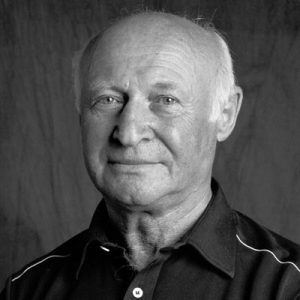Alexander Savranskiy

- Memphis, Tennessee
- Born: 1930 Tomashpol, Ukraine
- Survivor: Tomashpol Ghetto
Alexander's hometown was occupied by German soldiers after Russia was invaded. When his father became sick with a high fever, they learned that prescriptions were forbidden to Jews. “My mother and grandmother tried to help by wrapping him in linens,“ remembers Alexander, “but since we were not allowed to have medicine or even buy it, we could not save him.“
After his father died, his mother moved to nearby Vinnitsa to earn a living for the family. Eleven-year-old Alexander and his grandmother were sent to the Tomashpol Ghetto. His cousins were rounded up to go to work; instead they were shot to death, and their bodies fell into a common grave.
When the Soviet Army re-took the town three years later, he recalls, “We heard the shooting first but we never believed the Russians could win. It was strange. Even though they liberated us, they were hateful to us. They rescued us but called us 'dirty Jews' the whole time.” At war's end, Alexander and his mother stayed in Vinnitsa for several years while he tried to catch up in school. Even now, he says, “You can still see the sadness in the Jewish eyes. When I can't sleep at night now, it is always because of that. I see them still.”
“They hated us, they prepared for our deaths...but why?" Alexander Savranskiy still wonders why the Jewish people were targeted for extermination by the Nazis. "I don't know. I was never really the same. How could a boy be changed so deeply, so permanently? I was.”
Timeline
1930
Alexander Savranskiywas born in Tomashpol, Ukraine,a Jewish town.
1934
Alexander's father died from an illness; he was not given medication because he was Jewish.
1935
Alexander's mother moved to Odessa for a better job while Alexander stayed with his grandmother who continued to raise him.
1939
As Jewish schools all over Ukraine were closed, Jewish studentscould transfer to Ukrainian schools. However, due to the language barrier, they were demoted in grade level. Jewish teachers also became unemployed.
1941
July 22: The city of Tomashpol was occupied by the Russian and German Armies. The Russians and the Germans organized a volunteer army from the local people. They began taking young people to work, including Alexander’s 15- and 16-year-old cousins.They were not taken to camps; instead they and many other Jews were shot and placed in one mass grave.The Tomashpol Ghetto was formed. Wired fences were erected and anyone attempting to leave the area was shot.
1942
Alexander's babushka (grandmother)died. He then lived with cousins and other relatives in another house. There were 8 to 10 people per room.
1944
March 19: As the Russian army advanced into the city, they heard gunfire. It was a relief because they discovered that they were being liberated. Nonetheless, the Russians still called them 'dirty Jews'. Soon afterward, Alexander's mother returned to find him.Even as she raised him, guilt haunted her for having left him alone.
1995
Alexander and his wife moved to Memphis, Tennessee, to be closer to their daughter, who had moved there two years earlier.
2016
Alexander continues to reside in Memphis.
